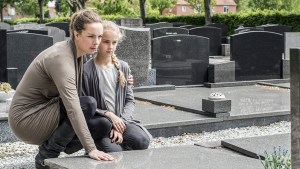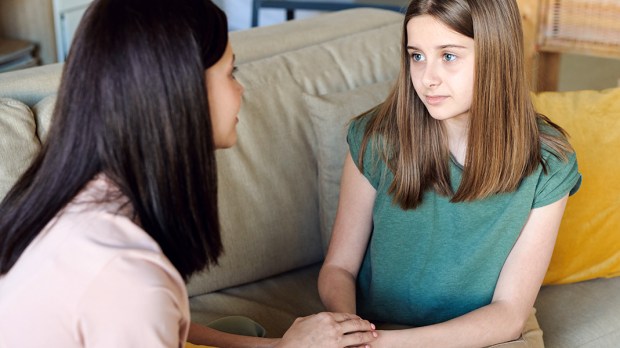With the pandemic dragging on and seeming to redouble in many states, many of us are wondering if this will ever end … and if so, when? And where is God in all this? The novelty and adrenaline have long worn off, replaced by creeping fear and doubt.
As adults, we’ve learned to recognize these emotions and work them out in conversations with trusted friends or family members. We know we’re not alone because every other article in our email and social media feed echoes our own worries. But this communal sense of fear and anxiety is pervasive. Much like invisible viral particles, it seems to be in the oxygen we breathe —and our children are breathing the same air. They feel it too.
What they might not feel is the comfort of solidarity—having been isolated from their friends for months and having limited means of communication, our kids might think their fears and doubts are theirs alone. That’s a heavy burden for kids to carry and we can lift it by having some honest conversations.
Here are a few guidelines to help your kids navigate this place of doubt and come through with a stronger faith.
DO:Lead with honesty
Every conversation is a little bit of give-and-take, so the best way to start a conversation with your kids is by giving them a glimpse of your own struggles. Don’t be afraid to share with your kids (in an age-appropriate manner) the doubts and fears you might be struggling with — even if those doubts cut to the heart of the faith you’re trying to instill in your kids. If you’ve thought to yourself, “Where is God and why doesn’t he care?” it’s OK to tell your kids that. Letting them see a glimpse of your own struggles will help them understand that faith is dynamic, relational, and God is big enough to handle all of our worries. Ultimately, you’ll be laying the groundwork for your kids to develop a richer, more authentic faith.
DON'T:Interrogate
If your kids haven’t said a word about faith and doubt during the pandemic, that doesn’t necessarily mean they aren’t thinking about it. They might not have the tools to express it or they might not want to add to your worries. Whatever the reason, you won’t earn their confidence by peppering them with questions about what they’re thinking and feeling. Kids who respond well to this have almost certainly already told you everything they’re thinking and feeling…without being prompted. Our little internal thinkers, though, will open up when they feel secure of our attention, understanding, and love. Make a point of trying to build that security in small ways every day .. .and embrace the virtue of patience, because it might be a while.

Read more:
How my kids and I are dealing with grief and mourning in isolation
DO:Talk on their schedule
I don’t know about y’all, but my kids bring up intense, awkward, and sometimes frightening life-or-death topics at the worst possible moments. In the public restroom at Target or at their older sister”s soccer game while I’m talking to another parent are two fan favorites. It’s hard, but make every effort to acknowledge and preserve the trust they’re showing you by having the conversation right then and there. If you must delay it, do so for no more than an hour or two — even if it means rearranging your schedule. Showing our kids that we value their confidence in us by taking them seriously and responding promptly is the key to helping them have the kind of trust we want them to have in God.
DON'T: Talk about it “later”
Sometimes you have no choice but to put a conversation off — but avoid putting it off until that elusive later. Later means never, and kids are smart enough to know that. No matter how horrible the timing, every genuine question is an expression of their trust and should be honored as such. Tell them you can talk about it in the car on the way home or while you’re making dinner, then stick to it like Gorilla Glue.
This goes double for the conversations you’re tempted to put off until after you’ve researched it or asked a friend or spouse—unfortunately those reconnaissance missions tend to happen days or even weeks later, if at all. By then, your child will have forgotten the topic entirely – -but not your lack of response. Resist the temptation to crowd-source your response, even if you’re looking for answers from experts. Be honest and give your kids the best answer you have in any given moment. You can always follow up later and explain that you’ve learned something new or someone gave you a different perspective to consider, but honesty engenders more honesty. If your kids express a fear you’re struggling with too, don’t try and assuage them. Admit your own fear, then share your strategies for combating fear and doubt. Good parents aren’t the ones that have the perfect answers to everything — they’re the ones who are present, connected, and honest.
DO: Take positive action
The worst part of fear and doubt is the way they paralyze us into inaction. We get stuck in a place of feeling and thinking, trying to find answers or comfort in ideas rather discovering them through action. Help your kids learn to face their fears head-on. If they’re afraid COVID for themselves or loved ones, teach them the virtue of caring for others by learning to make masks … and encourage them to wear those masks as an act of compassion rather than self-preservation. Shifting the focus to actively protecting others will build compassion while preventing them (and you!) from slipping into a state of self-preservation via suspicion and isolation.
DON'T:Isolate and ruminate
Social distance does not mean social isolation. Isolation is actually one of the most destructive things for our physical, mental, and spiritual well-being. Tell your kids this and help them find ways to stay safely connected to friends, family, and even strangers. Don’t foster anxiety and fear by leaving the news on at all hours of the day, constantly checking headlines, and having endless conversations about the state of the pandemic. Deal with the facts calmly as they arise and avoid guesswork, theories, and imaginary potential crises. We can’t change the choke-hold that fear and uncertainty currently has on our culture, but we can minimize and even eliminate it in our own homes.

Read more:
Josh Garrels offers hymns of peace in a time of fear

